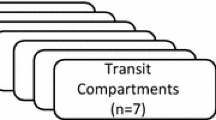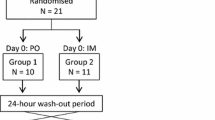Abstract
Objective
The purpose of this study was to determine the population pharmacokinetics of mefloquine in healthy military personnel during prophylaxis for malaria infections.
Methods
The subjects were 1,111 Australian soldiers participating in two studies: a randomised double-blinded study (group A, 161 subjects) and an open-label study (group B, 950 subjects). Following a loading dose (250 mg mefloquine base daily, 3 days), subjects received an oral weekly maintenance dose of 250 mg over 6 months. Blood was collected after the last split loading dose then at weeks 4, 8 and 16 for group A, and at weeks 13 and 26 for group B. Plasma mefloquine concentrations were measured by high-performance liquid chromatography (HPLC). Pharmacokinetic modelling was performed using NONMEM.
Results
A two-compartment model with inter-occasion variability (IOV) for clearance satisfactorily described the pharmacokinetics. Typical values were clearance (CL/F, 2.09 l/h), central volume of distribution (V1/F, 528 l), absorption rate constant (KA, 0.24 h−1), inter-compartmental clearance (Q/F, 12.5 l/h), peripheral volume of distribution (V2/F, 483 l) and elimination half-life (t 1/2, 14.0 days). Weight had a positive influence on central volume but was insufficient to warrant dosage adjustments. The inter-individual variability (coefficient of variation, CV%) for CL/F and V1/F was 24.4% and 29.6%, respectively. The IOV for CL/F was 17.8%. The proportional residual error (CV%) for groups A and B was 11.5% and 19.5%, respectively, and the additive error standard deviation (SD) was 57 ng/ml and 149 ng/ml, respectively.
Conclusion
The typical parameter values were comparable with those estimated in much smaller cohorts of healthy subjects and in malaria patients treated with single-dose mefloquine. The lower unexplained variability in the blinded study suggested these subjects may have been more compliant in taking their medication than soldiers in the open-label study.

Similar content being viewed by others
References
World Health Organization “International Travel and Health” 2005. Available at: http://www.who.int/malaria
US Center for Disease Control. Available at: http://www.cdc.gov/travel/malariadrugs.htm
Sanchez JL, DeFraites RF, Sharp TW, Hanson RK (1993) Mefloquine or doxycycline prophylaxis in US troops in Somalia. Lancet 341:1021–1022
Peragallo MS, Sabatinelli G, Sarnicola G (1999) Compliance and tolerability of mefloquine and chloroquine plus proguanil for long-term malaria chemoprophylaxis in groups at particular risk (the military). Trans R Soc Trop Med Hyg 93:73–77
Boudreau E, Schuster B, Sanchez J, Novakowski W, Johnson R, Redmond D, Hanson R, Dausel L (1993) Tolerability of prophylactic Lariam® regimens. Trop Med Parasitol 44:257–265
Lobel HO, Miani M, Eng T, Bernard KW, Hightower AW, Campbell CC (1993) Long-term malaria prophylaxis with weekly mefloquine. Lancet 341:848–851
Steffen R, Fuchs E, Schildknecht J, Naef U, Funk M, Schlagenhauf P, Phillips-Howard P, Nevill C, Sturchler D (1993) Mefloquine compared with other malaria chemoprophylactic regimens in tourists visiting east Africa. Lancet 341:1299–1303
Jaspers CA, Hopperus Buma AP, van Thiel PP, van Hulst RA, Kager PA (1996) Tolerance of mefloquine chemoprophylaxis in Dutch military personnel. Am J Trop Med Hyg 55:230–234
Ohrt C, Richie TL, Widjaja H, Shanks GD, Fitriadi J, Fryauff DJ, Handschin J, Tang D, Sandjaja B, Tjitra E, Hadiarso L, Watt G, Wignall FS (1997) Mefloquine compared with doxycycline for the prophylaxis of malaria in Indonesian soldiers. A randomized, double-blind, placebo-controlled Group. Ann Intern Med 126:963–972
Schlagenhauf P, Lobel H, Steffen R, Johnson R, Popp K, Tschopp A, Letz R, Crevoiser C (1997) Tolerance of mefloquine by SwissAir trainee pilots. Am J Trop Med Hyg 56:235–240
Overbosch D, Schilthuis H, Bienzle U, Behrens RH, Kain KC, Clarke PD, Toovey S, Knobloch J, Nothdurft HD, Shaw D, Roskell NS, Chulay JD (2001) Atovaquone-proguanil versus mefloquine for malaria prophylaxis in nonimmune travelers: results from a randomized, double-blind study. Clin Infect Dis 33:1015–1021
Schlagenhauf P, Tschopp A, Johnson R, Nothdurft HD, Beck B, Schwartz E, Herold M, Krebs B, Veit O, Allwinn R, Steffen R (2003) Tolerability of malaria chemoprophylaxis in non-immune travellers to sub-Saharan Africa: multicentre, randomised, double blind, four arm study. BMJ 327:1078–1084
Looareesuwan S, White NJ, Warrell DA, Forgo I, Dubach UG, Ranalder UB, Schwartz DE (1987) Studies of mefloquine bioavailability and kinetics using a stable isotope technique: a comparison of Thai patients with falciparum malaria and healthy Caucasian volunteers. Br J Clin Pharmacol 24:37–42
Desjardins RE, Pamplin CL, von Bredow J, Barry KG, Canfield CJ (1979) Kinetics of a new antimalarial, mefloquine. Clin Pharmacol Ther 26:372–379
Weidekamm E, Schwartz DE, Dubach UC, Weber B (1987) Single-dose investigation of possible interactions between the components of the antimalarial combination Fansimef. Chemotherapy 33:259–265
Karbwang J, Back DJ, Bunnag D, Breckenridge AM (1988) A comparison of the pharmacokinetics of mefloquine in healthy Thai volunteers and in Thai patients with falciparum malaria. Eur J Clin Pharmacol 35:677–680
Franssen G, Rouveix B, Lebras J, Bauchet J, Verdier F, Michon C, Bricaire F (1989) Divided-dose kinetics of mefloquine in man. Br J Clin Pharmacol 28:179–184
Nosten F, ter Kuile F, Chongsuphajaisiddhi T, Na Bangchang K, Karbwang J, White NJ (1991) Mefloquine pharmacokinetics and resistance in children with acute falciparum malaria. Br J Clin Pharmacol 31:556–559
Pennie RA, Koren G, Crevoisier C (1993) Steady-state pharmacokinetics of mefloquine in long-term travellers. Trans R Soc Trop Med Hyg 87:459–462
Mimica I, Fry W, Eckert G, Schwartz DE (1983) Multiple-dose kinetic study of mefloquine in healthy male volunteers. Chemotherapy 29:184–187
Schwartz DE, Weidekamm E, Mimica I, Heizmann P, Portmann R (1987) Multiple-dose pharmacokinetics of the antimalarial drug Fansimef (pyrimethamine + sulfadoxine + mefloquine) in healthy subjects. Chemotherapy 33:1–8
Nasveld P, Brennan L, Edstein M, Kitchener S, Leggat P, Rieckmann K Randomised, double-blind comparative study to evaluate the safety, tolerability and effectiveness of tafenoquine and mefloquine for the prophylaxis of malaria in non-immune Australian soldiers. 51st annual meeting of American Society of Tropical Medicine and Hygiene, Denver, USA, November 2002
Kitchener SJ, Nasveld PE, Gregory RM, Edstein MD (2005) Mefloquine and doxycycline malaria prophylaxis in Australian soldiers in East Timor. Med J Aust 182:168–171
Riviere JH, Back DJ, Breckenridge AM, Howells RE (1985) The pharmacokinetics of mefloquine in man: lack of effect of mefloquine on antipyrine metabolism. Br J Clin Pharmacol 20:469–474
Bergqvist Y, Hellgren U, Churchill FC (1988) High-performance liquid chromatographic assay for the simultaneous monitoring of mefloquine and its acid metabolite in biological samples using protein precipitation and ion-pair extraction. J Chromatogr 432:253–263
Simpson JA, Price R, ter Kuile F, Teja-Isavatharm P, Nosten F, Chongsuphajaisiddhi T, Looareesuwan S, Aarons L, White NJ (1999) Population pharmacokinetics of mefloquine in patients with acute falciparum malaria. Clin Pharmacol Ther 66:472–484
Ashley EA, Stepniewska K, Lindegardh N, McGready R, Hutagalung R, Hae R, Singhasivanon P, White NJ, Nosten F (2006) Population pharmacokinetic assessment of a new regimen of mefloquine used in combination treatment of uncomplicated falciparum malaria. Antimicrob Agents Chemother 50:2281–2285
Svensson USH, Alin MH, Karlsson MO, Bergqvist Y, Ashton M (2002) Population pharmacokinetic and pharmacodynamic modelling of artemisinin and mefloquine enantiomers in patients with falciparum malaria. Eur J Clin Pharmacol 58:339–351
Price R, Simpson JA, Teja-Isavatharm P, Than MM, Luxemburger C, Heppner DG, Chongsuphajaisiddhi T, Nosten F, White NJ (1999) Pharmacokinetics of mefloquine combined with artesunate in children with acute falciparum malaria. Antimicrob Agents Chemother 43:341–346
Dao NVH, Quoc NP, Ngoa ND, Thuy LT, The ND, Dai B, Binh VQ, Rieckmann KH, Edstein MD (2005) Fatty-food does not alter blood mefloquine concentrations in the treatment of falciparum malaria. Trans Roy Soc Trop Med Hyg 99:927–931
Schwartz E, Paul F, Pener H, Almog S, Rotenberg M, Golenser J (2001) Malaria antibodies and mefloquine levels among United Nations troops in Angola. J Travel Med 8:113–116
Schwartz E, Potasman I, Rotenberg M, Almog S, Sadetzki S (2001) Serious adverse events of mefloquine in relation to blood level and gender. Am J Trop Med Hyg 65:189–192
Slutsker LM, Khoromana CO, Payne D, Allen CR, Wirima JJ, Heymann DL, Patchen L, Steketee RW (1990) Mefloquine therapy for Plasmodium falciparum malaria in children under 5 years of age in Malawi: in vivo/in vitro efficacy and correlation of drug concentration with parasitological outcome. Bull World Health Organ 68:53–59
Beal SL (2001) Ways to fit a PK model with some data below the quantification limit. J Pharmacokin Pharmacodyn 28:481–504
Yano Y, Beal SL, Sheiner LB (2001) Evaluating pharmacokinetic/ pharmacodynamic models using the posterior predictive check. J Pharmacokinet Pharmacodyn 28:171–192
Acknowledgments
The authors thank the Australian military personnel who participated as the subjects in this study and the co-ordinational and monitoring support of Squadron Leader Karen Leshinkas, Captain Kym Ward, Captain John Cunningham, Captain Damien Wood and Captain Tracy Carthew. We are grateful to Lieutenant Colonel William Prescott [US Army Medical Materiel Development Activity (USAMMDA)] and Philip Pickford [GlaxoSmithKline (GSK)] for being the project managers for the Phase III clinical study. The technical contribution of Mr. Tom Travers and Sergeant Hamish Barbour to the mefloquine HPLC analysis is gratefully acknowledged. We also thank the military staff from the Australian Army Malaria Institute who assisted with the blood collections and processing, and Mr. Tom Travers and Sergeants Hamish Barbour, Kerry Rowcliffe and Christine Atkins for data entry. Financial support for the study was provided by USAMMDA, GSK and the Australian Defence Force. The opinions expressed in this paper are those of the authors and do not necessarily reflect those of the Australian Defence Health Service or any extant Australian Defence Force policy. The experimental work complies with the current laws of Australia. The work reported herein forms part of a dissertation by Ms. Anna Blomgren to Uppsala University, Sweden, for the MSc degree (Chemical Engineering).
Author information
Authors and Affiliations
Corresponding author
Rights and permissions
About this article
Cite this article
Charles, B.G., Blomgren, A., Nasveld, P.E. et al. Population pharmacokinetics of mefloquine in military personnel for prophylaxis against malaria infection during field deployment. Eur J Clin Pharmacol 63, 271–278 (2007). https://doi.org/10.1007/s00228-006-0247-3
Received:
Accepted:
Published:
Issue Date:
DOI: https://doi.org/10.1007/s00228-006-0247-3




